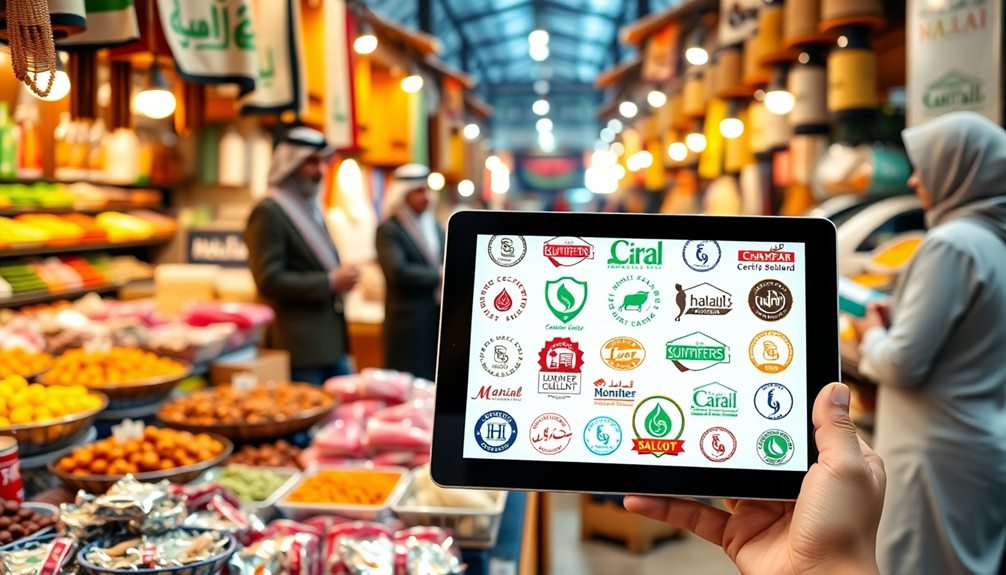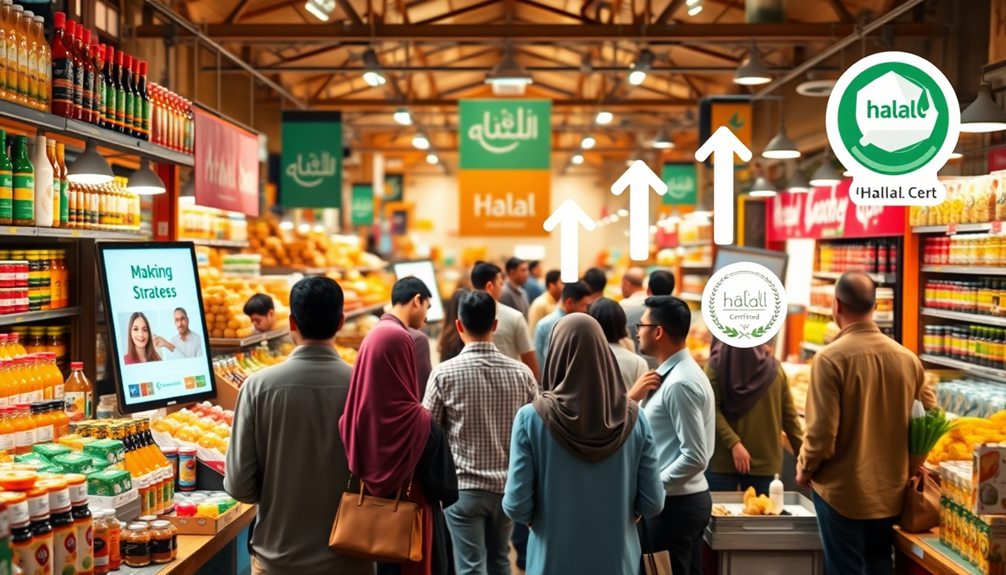Building a halal online business in the MENA region is a smart move, with a market projected to reach $2.4 trillion. You'll need to focus on understanding halal e-commerce and the importance of certified suppliers to guarantee compliance. Customer trust hinges on transparent practices, so show your sourcing methods clearly. Explore market gaps in personal care or cosmetics, as these areas are growing. Don't forget to employ effective marketing strategies aimed at the unique values of halal consumers. The potential for success is immense, and there's plenty more to uncover that could guide your approach.
Key Takeaways
- Understand halal certifications and partner with reputable suppliers to ensure compliance and build consumer trust in the MENA market.
- Conduct thorough market research to identify gaps and tailor products that meet the growing demand for halal e-commerce.
- Leverage social media and influencer partnerships to effectively reach and engage halal consumers, enhancing brand visibility.
- Implement transparency in supply chains to foster customer confidence, as 70% of consumers prioritize it in their purchasing decisions.
- Provide excellent customer service and personalized experiences to build loyalty and enhance your brand's reputation in the halal online market.
Understanding Halal E-Commerce

Understanding halal e-commerce starts with recognizing its rapid growth and significance in today's market. With projections estimating the halal e-commerce market to reach $2.4 trillion by 2024, there's a clear demand for halal-certified products and services that comply with Islamic law.
This market isn't just limited to food; it spans a diverse range, including cosmetics, pharmaceuticals, and fashion. By focusing on Abraham's Business Success Principles, entrepreneurs can cultivate a mindset that attracts abundance and enhances their professional growth in the halal sector.
To succeed, you need to conduct thorough market research. This helps you identify gaps in existing offerings and tailor your products to meet specific consumer preferences. As the global Muslim population grows, the demand for halal products is expanding beyond Muslim-majority regions, appealing to ethically conscious consumers everywhere.
Building customer loyalty is essential in this competitive landscape. Trust plays a crucial role, so ensuring your products come with well-accredited halal certifications from recognized organizations is key.
This enhances your brand's credibility and boosts consumer confidence. By embracing these strategies, you can effectively position your business in the halal e-commerce sector, catering to a diverse audience while adhering to the necessary standards.
Identifying Market Opportunities

How can you tap into the booming halal market? The MENA region's halal market is set to reach a staggering $2.4 trillion by 2024, presenting vast market opportunities for your halal online business.
With a rising Muslim population, the demand for halal products is increasing across food, cosmetics, and fashion. Significantly, 62% of consumers in the region prefer shopping for halal products online, which underscores the importance of a robust e-commerce business strategy.
Additionally, the growing interest in sustainability in tea production can be a compelling angle to explore, as ethical sourcing and organic products are becoming increasingly important to consumers.
One area ripe for exploration is halal-certified personal care and cosmetic products. There's a significant gap in this market, as consumers increasingly seek ethical and natural ingredients. By focusing on this niche, you can capture the attention of conscientious buyers.
Moreover, competitor analysis reveals that many existing halal e-commerce platforms fall short in customer service and product diversity. This gap gives you an edge; by offering superior service and a wide range of halal products, you can stand out.
Embrace these market opportunities, and you'll be well-positioned to succeed in the flourishing halal online business landscape.
Sourcing Halal Products

When sourcing halal products, you need to establish strong relationships with certified suppliers to guarantee compliance with Islamic standards.
Understanding the cultural significance of these products, particularly in the context of the cultural nuances of the Deaf community, is fundamental for fostering trust and respect.
It's vital to verify the quality and halal certification of your partners, as this builds trust with your customers.
Supplier Relationships and Partnerships
Building strong supplier relationships is essential for successful sourcing of halal products. By partnering with reputable suppliers who hold valid halal certifications, you guarantee that all products comply with Islamic law requirements.
It's important to prioritize sourcing from certified halal suppliers that emphasize ethical production practices. This approach not only builds trust but also promotes transparency in your supply chain.
Consider utilizing local halal producers to enhance your product diversity while supporting local economies and minimizing transportation-related environmental impact. This strategy can strengthen community ties and reduce your carbon footprint.
Regularly assess your suppliers' adherence to halal standards through a rigorous compliance verification process. This will help you maintain high product quality and uphold halal integrity.
Fostering long-term relationships with suppliers through open communication and collaboration is significant. This way, you can guarantee a reliable supply chain that aligns with halal principles.
Compliance and Quality Assurance
Maintaining compliance and quality assurance in sourcing halal products is essential for your business's integrity and reputation. To achieve this, consider the following key practices:
- Partner with Certified Suppliers: Establish relationships with suppliers who've proper halal certification, ensuring they can provide documentation that guarantees compliance with halal standards.
- Implement Quality Assurance Protocols: Develop rigorous protocols to maintain product quality and verify adherence to halal certification throughout your supply chain.
- Source Locally: Prioritize sourcing from local halal producers to support community businesses, enhance product freshness, and reduce transportation-related carbon footprints.
- Ensure Transparency: Clearly communicate your sourcing practices and halal certifications to your customers, building trust and confidence in the products you offer.
Regularly review and update supplier certifications to stay informed about changes in halal standards.
This ongoing commitment to compliance and quality assurance not only safeguards your reputation but also fosters customer loyalty in the growing halal market.
Importance of Certifications

Certifications play an essential role in establishing trust and credibility in the halal online market. Obtaining halal certifications from recognized organizations, like the Halal Certification Authority, meaningfully boosts your brand credibility. When consumers see these certifications, they feel assured that your products comply with Islamic law. This assurance is important, especially in Muslim-majority regions where buyers prefer halal-certified products.
As the global halal market is projected to reach $2.4 trillion by 2024, it's clear that capitalizing on this expanding consumer base hinges on your commitment to halal standards. Regularly updating and maintaining your certifications is fundamental to align with evolving halal requirements. This not only fosters consumer trust but also builds loyalty among your customers.
Moreover, displaying halal certifications prominently on your e-commerce platform can enhance consumer confidence. In a competitive market, these certifications differentiate your products, making them more appealing to potential buyers.
Effective Halal Marketing Strategies

In today's competitive market, understanding the distinct needs of halal consumers is essential for crafting effective marketing strategies.
Here are four key tactics to take into account:
- Culturally Sensitive Messaging: Tailor your marketing messages to align with halal principles, as 70% of halal consumers prefer brands that reflect their values.
- Leverage Social Media Marketing: With over 50% of halal consumers using social media to find new halal food products, a strong online presence can greatly boost your visibility.
- Influencer Partnerships: Engage with influencers, as 45% of millennials trust their recommendations. This can help you reach your target audience more effectively.
- Seasonal Promotions: Implement campaigns during notable Islamic events like Ramadan to capitalize on increased demand for halal products.
Building Customer Trust

Building customer trust in your halal online business starts with being transparent about your supply chains.
When you openly share information about sourcing and production methods, you reassure consumers that you're committed to ethical practices.
Engaging with your community and showcasing social proof can further strengthen that trust and credibility.
Transparency in Supply Chains
Ensuring transparency in your supply chain is essential for gaining customer trust in the halal online market. Consumers want to know where their halal products come from and how they're made.
Here are four key reasons why transparency matters:
- Consumer Preference: 70% of consumers consider supply chain transparency vital in their purchasing decisions.
- Loyalty Boost: Providing detailed supplier and production information fosters loyalty, encouraging repeat purchases from trusted brands.
- Technological Advantage: Utilizing technology like blockchain allows for real-time tracking of halal certification and ingredient origins, enhancing consumer confidence.
- Credibility: Nearly 80% of consumers prefer buying from companies that openly share their practices, so prominently displaying halal certifications can notably enhance your brand's credibility.
When you prioritize transparency in your supply chains, you not only build consumer trust but also create a loyal base of customers who appreciate your commitment to ethical practices.
In the competitive world of online shopping, being transparent about your halal products sets you apart and strengthens your brand's reputation.
Embrace this approach to reveal the full potential of your halal online business.
Engaging Community Outreach
Frequently engaging in community outreach can considerably enhance customer trust by showcasing your commitment to social responsibility and ethical practices.
As a Halal business, aligning your initiatives with Islamic values like Ihsan not only reinforces trust but also resonates deeply with your audience.
Hosting local events and workshops allows you to connect with consumers directly, understanding their needs and preferences. This interaction helps build a loyal customer base, showing that you genuinely care about their interests.
Utilize social media platforms to share customer testimonials and success stories; this creates a sense of community and authenticity that potential buyers crave.
Collaborating with local influencers who embody halal principles can further boost your brand credibility. Their endorsement can amplify your reach and engagement within the community, enhancing consumer confidence in your offerings.
Moreover, regularly soliciting and acting on consumer feedback through surveys or focus groups is essential. This shows that you're not only listening but also adapting to their desires, solidifying trust and loyalty.
Leveraging Social Proof
Often, incorporating social proof into your marketing strategy can greatly bolster customer trust. By showcasing the experiences of others, you can create a sense of reliability around your products and services.
Here are four effective ways to leverage social proof:
- Showcase Customer Feedback: Highlight reviews and testimonials prominently on your site. Since 79% of consumers are influenced by user-generated content, this can greatly impact purchasing decisions.
- Engage with Influencers: Collaborate with influencers in the halal community. With 49% of consumers relying on their recommendations, their endorsements can amplify your credibility.
- Display Certifications: Clearly exhibit any relevant certifications that align with Islamic guidelines. Transparency is key, as 86% of consumers seek trust signals before making a purchase.
- Build a Community: Foster customer interactions and feedback through social media and forums. This not only enhances loyalty but also encourages 70% of consumers to recommend your brand when they feel engaged.
Enhancing Customer Service

Exceptional customer service is crucial for your halal online business to thrive. To achieve this, train your staff to have in-depth knowledge of halal products, enabling them to effectively address customer inquiries and concerns. This expertise builds trust and enhances the overall customer experience.
Implement multiple communication channels like live chat, email, and phone support. This accessibility caters to diverse customer preferences and guarantees you're responsive to their needs.
Personalizing customer experiences by tailoring recommendations and offers based on individual preferences can greatly increase satisfaction and loyalty in the halal market.
Don't forget the power of a loyalty program. By rewarding repeat customers, you foster a sense of community and encourage ongoing engagement. This not only boosts sales but also strengthens your brand's reputation.
Leveraging Social Proof

Building on the strong customer service foundation you've established, leveraging social proof can further enhance your halal online business.
By integrating social proof into your strategy, you can greatly influence purchasing decisions and build trust. Consider these four key approaches:
- Customer Testimonials: Showcase authentic feedback on your website; 72% of consumers take action after reading positive reviews.
- Halal Certifications: Display these prominently to reassure customers about your products' quality and legitimacy in the growing halal market.
- Influencer Recommendations: Collaborate with influential figures in the halal community. Nearly 49% of consumers trust their recommendations when making purchases.
- Social Media Engagement: Actively respond to reviews and feedback to foster community trust, which can boost customer loyalty by 30%.
Frequently Asked Questions
What Are the Key Demographics of Halal Consumers in the MENA Region?
When exploring halal consumers, you'll find diverse demographics, including varying ages, income levels, and educational backgrounds. Many prioritize ethical consumption, health benefits, and cultural identity, influencing their purchasing decisions in the halal market.
How Do Local Regulations Impact Halal Online Businesses?
Local regulations shape your halal online business considerably. They dictate product standards, labeling, and certification processes. You'll need to stay updated on these rules to guarantee compliance and build trust with your consumers effectively.
What Payment Methods Are Preferred by Halal Online Shoppers?
When it comes to halal online shoppers, convenience reigns supreme. They prefer payment methods like credit cards, e-wallets, and bank transfers, ensuring secure transactions while enjoying seamless shopping experiences without any hassle.
Are There Specific Logistics Challenges for Halal E-Commerce in MENA?
Yes, you'll face specific logistics challenges in halal e-commerce, like ensuring compliance with halal standards during shipping, managing temperature-sensitive products, and steering through varying regulations across countries. These factors can complicate your supply chain and delivery processes.
How Can Businesses Measure the Success of Their Halal Online Strategies?
To measure success, you'll want to compare sales growth against customer engagement. While increased traffic shows interest, conversion rates reveal effectiveness. Balancing both metrics helps you refine strategies and boost your halal online presence.
Conclusion
In the MENA region, diving into the halal online business isn't just a chance; it's your ticket to a thriving empire! By mastering e-commerce, tapping into market opportunities, and sourcing high-quality halal products, you'll be the go-to brand everyone raves about. With the right certifications and marketing strategies, you'll build unshakeable customer trust. So, gear up, because the halal market isn't just booming – it's exploding, and you're at the forefront of this revolution!









